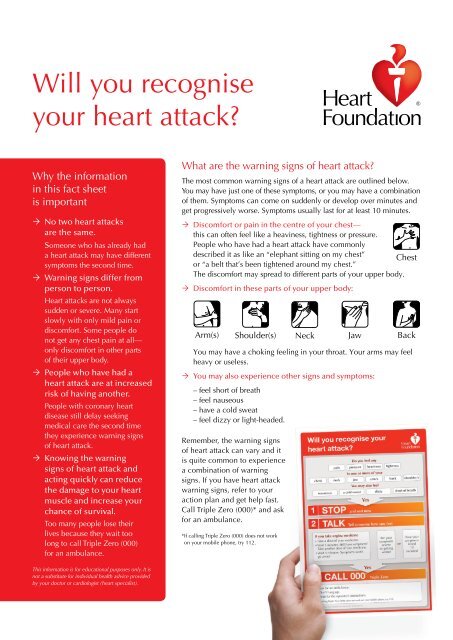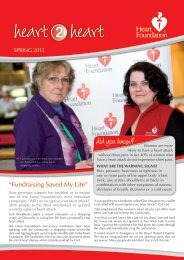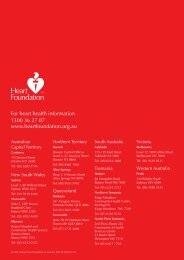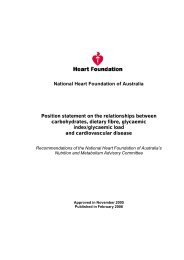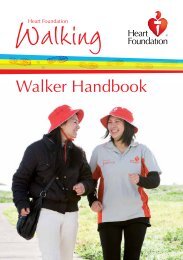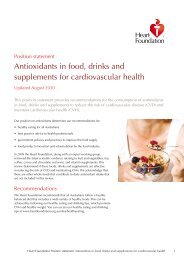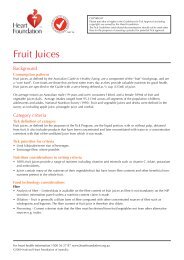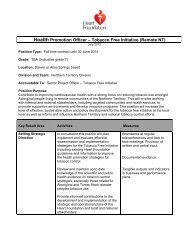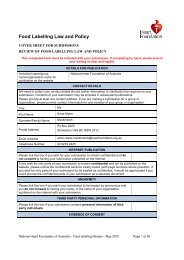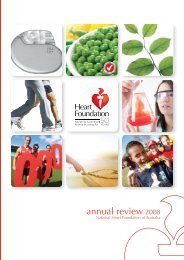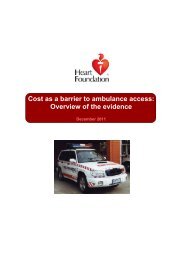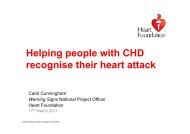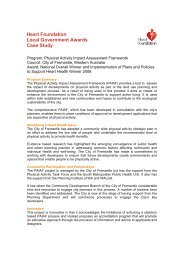Will you recognise your heart attack? - National Heart Foundation
Will you recognise your heart attack? - National Heart Foundation
Will you recognise your heart attack? - National Heart Foundation
You also want an ePaper? Increase the reach of your titles
YUMPU automatically turns print PDFs into web optimized ePapers that Google loves.
<strong>Will</strong> <strong>you</strong> <strong>recognise</strong><br />
<strong>you</strong>r <strong>heart</strong> <strong>attack</strong>?<br />
Why the information<br />
in this fact sheet<br />
is important<br />
No two <strong>heart</strong> <strong>attack</strong>s<br />
are the same.<br />
Someone who has already had<br />
a <strong>heart</strong> <strong>attack</strong> may have different<br />
symptoms the second time.<br />
Warning signs differ from<br />
person to person.<br />
<strong>Heart</strong> <strong>attack</strong>s are not always<br />
sudden or severe. Many start<br />
slowly with only mild pain or<br />
discomfort. Some people do<br />
not get any chest pain at all—<br />
only discomfort in other parts<br />
of their upper body.<br />
People who have had a<br />
<strong>heart</strong> <strong>attack</strong> are at increased<br />
risk of having another.<br />
People with coronary <strong>heart</strong><br />
disease still delay seeking<br />
medical care the second time<br />
they experience warning signs<br />
of <strong>heart</strong> <strong>attack</strong>.<br />
Knowing the warning<br />
signs of <strong>heart</strong> <strong>attack</strong> and<br />
acting quickly can reduce<br />
the damage to <strong>you</strong>r <strong>heart</strong><br />
muscle and increase <strong>you</strong>r<br />
chance of survival.<br />
Too many people lose their<br />
lives because they wait too<br />
long to call Triple Zero (000)<br />
for an ambulance.<br />
What are the warning signs of <strong>heart</strong> <strong>attack</strong>?<br />
The most common warning signs of a <strong>heart</strong> <strong>attack</strong> are outlined below.<br />
You may have just one of these symptoms, or <strong>you</strong> may have a combination<br />
of them. Symptoms can come on suddenly or develop over minutes and<br />
get progressively worse. Symptoms usually last for at least 10 minutes.<br />
Discomfort or pain in the centre of <strong>you</strong>r chest—<br />
this can often feel like a heaviness, tightness or pressure.<br />
People who have had a <strong>heart</strong> <strong>attack</strong> have commonly<br />
described it as like an “elephant sitting on my chest” Chest<br />
or “a belt that’s been tightened around my chest.”<br />
The discomfort may spread to different parts of <strong>you</strong>r upper body.<br />
Discomfort in these parts of <strong>you</strong>r upper body:<br />
Arm(s) Shoulder(s) Neck Jaw<br />
Arm(s)<br />
Shoulder(s)<br />
You may have a choking feeling in <strong>you</strong>r throat. Your arms may feel<br />
heavy or useless.<br />
You may also experience other signs and symptoms:<br />
– feel short of breath<br />
– feel nauseous<br />
– have a cold sweat<br />
– feel dizzy or light-headed.<br />
Remember, the warning signs<br />
of <strong>heart</strong> <strong>attack</strong> can vary and it<br />
is quite common to experience<br />
a combination of warning<br />
signs. If <strong>you</strong> have <strong>heart</strong> <strong>attack</strong><br />
warning signs, refer to <strong>you</strong>r<br />
action plan and get help fast.<br />
Call Triple Zero (000)* and ask<br />
for an ambulance.<br />
*If calling Triple Zero (000) does not work<br />
on <strong>you</strong>r mobile phone, try 112.<br />
Neck<br />
Jaw<br />
Chest<br />
Back<br />
Back<br />
This information is for educational purposes only. It is<br />
not a substitute for individual health advice provided<br />
by <strong>you</strong>r doctor or cardiologist (<strong>heart</strong> specialist).
Warning signs of <strong>heart</strong> <strong>attack</strong>—what to do<br />
Stop—Immediately stop what <strong>you</strong> are doing and rest.<br />
Talk—If <strong>you</strong> are with someone, tell them what <strong>you</strong> are feeling.<br />
If <strong>you</strong> take angina medicine:<br />
– Take one dose of <strong>you</strong>r angina medicine. Wait 5 minutes.<br />
– Still have symptoms? Take another dose of <strong>you</strong>r medicine.<br />
Wait another 5 minutes.<br />
If any of <strong>you</strong>r symptoms:<br />
– are severe<br />
– get worse quickly<br />
– have lasted 10 minutes<br />
Call Triple Zero (000)* now!<br />
Ask for an ambulance. Don’t hang up. Wait for advice from the operator.<br />
*If calling Triple Zero (000) does not work on <strong>you</strong>r mobile phone, try 112.<br />
Why is a <strong>heart</strong> <strong>attack</strong> an emergency?<br />
With <strong>heart</strong> <strong>attack</strong>, every minute counts. Too many people lose their lives<br />
because they take too long to call Triple Zero (000) for an ambulance.<br />
Getting to hospital quickly can reduce the damage to <strong>you</strong>r <strong>heart</strong> muscle and<br />
increase <strong>you</strong>r chance of survival. In hospital, staff will give <strong>you</strong> treatments<br />
that help to reduce this damage.<br />
Why call Triple Zero (000)?<br />
Calling Triple Zero (000) gets <strong>you</strong>:<br />
an ambulance fast<br />
treatment as soon as <strong>you</strong> phone<br />
advice on what to do while waiting for the ambulance to arrive.<br />
Ambulance paramedics are trained to use special lifesaving equipment<br />
and to start early treatments for <strong>heart</strong> <strong>attack</strong> inside the ambulance.<br />
The ambulance is the safest and fastest way to get <strong>you</strong> to hospital. It gets<br />
<strong>you</strong> medical attention straight away. Attempting to get to hospital quickly<br />
in a private vehicle can be dangerous for the occupants of <strong>you</strong>r vehicle<br />
and other road users.<br />
It is always better to go to hospital and be told it’s not a <strong>heart</strong> <strong>attack</strong><br />
than to stay at home until it is too late.<br />
Want to know more?<br />
For more information about the warning signs of <strong>heart</strong> <strong>attack</strong>,<br />
visit www.<strong>heart</strong>foundation.org.au.<br />
Be prepared<br />
Know the warning signs of<br />
<strong>heart</strong> <strong>attack</strong> and what to do.<br />
Keep <strong>you</strong>r action plan<br />
handy (on <strong>you</strong>r fridge or in<br />
<strong>you</strong>r wallet/purse).<br />
Make sure that <strong>you</strong> have<br />
ambulance cover.<br />
Tell <strong>you</strong>r family and friends<br />
about the warning signs of<br />
<strong>heart</strong> <strong>attack</strong> and what to do—<br />
don’t keep this lifesaving<br />
message to <strong>you</strong>rself.<br />
Prevent another <strong>heart</strong> <strong>attack</strong><br />
by taking steps to reduce <strong>you</strong>r<br />
risk—talk to <strong>you</strong>r doctor or visit<br />
www.<strong>heart</strong>foundation.org.au.<br />
© 2009–2010 <strong>National</strong> <strong>Heart</strong> <strong>Foundation</strong> of Australia<br />
ABN 98 008 419 761<br />
CON-075.v2<br />
Terms of use: This material has been developed for general<br />
information and educational purposes only. It does not<br />
constitute medical advice. Please consult <strong>you</strong>r health<br />
care provider if <strong>you</strong> have, or suspect <strong>you</strong> have, a health<br />
problem. The information contained in this material has<br />
been independently researched and developed by the<br />
<strong>National</strong> <strong>Heart</strong> <strong>Foundation</strong> of Australia and is based on the<br />
available scientific evidence at the time of writing. It is not an<br />
endorsement of any organisation, product or service.<br />
While care has been taken in preparing the content of this<br />
material, the <strong>National</strong> <strong>Heart</strong> <strong>Foundation</strong> of Australia and its<br />
employees cannot accept any liability, including for any loss<br />
or damage, resulting from the reliance on the content, or for<br />
its accuracy, currency and completeness.<br />
This material may be found in third parties’ programs or<br />
materials (including but not limited to show bags or advertising<br />
kits). This does not imply an endorsement or recommendation<br />
by the <strong>National</strong> <strong>Heart</strong> <strong>Foundation</strong> of Australia for such<br />
third parties’ organisations, products or services, including<br />
these parties’ materials or information. Any use of <strong>National</strong><br />
<strong>Heart</strong> <strong>Foundation</strong> of Australia material by another person<br />
or organisation is done so at the user’s own risk. The entire<br />
contents of this material are subject to copyright protection.


